ASTANA – This week, Kazakh President Kassym-Jomart Tokayev paid an official visit to China. Lasting three days, the visit consisted of high-level meetings, strategic discussions, and agreements expected to enhance the ties between the two nations. Kazakh experts have shared their insights regarding the implications of President Tokayev’s visit.
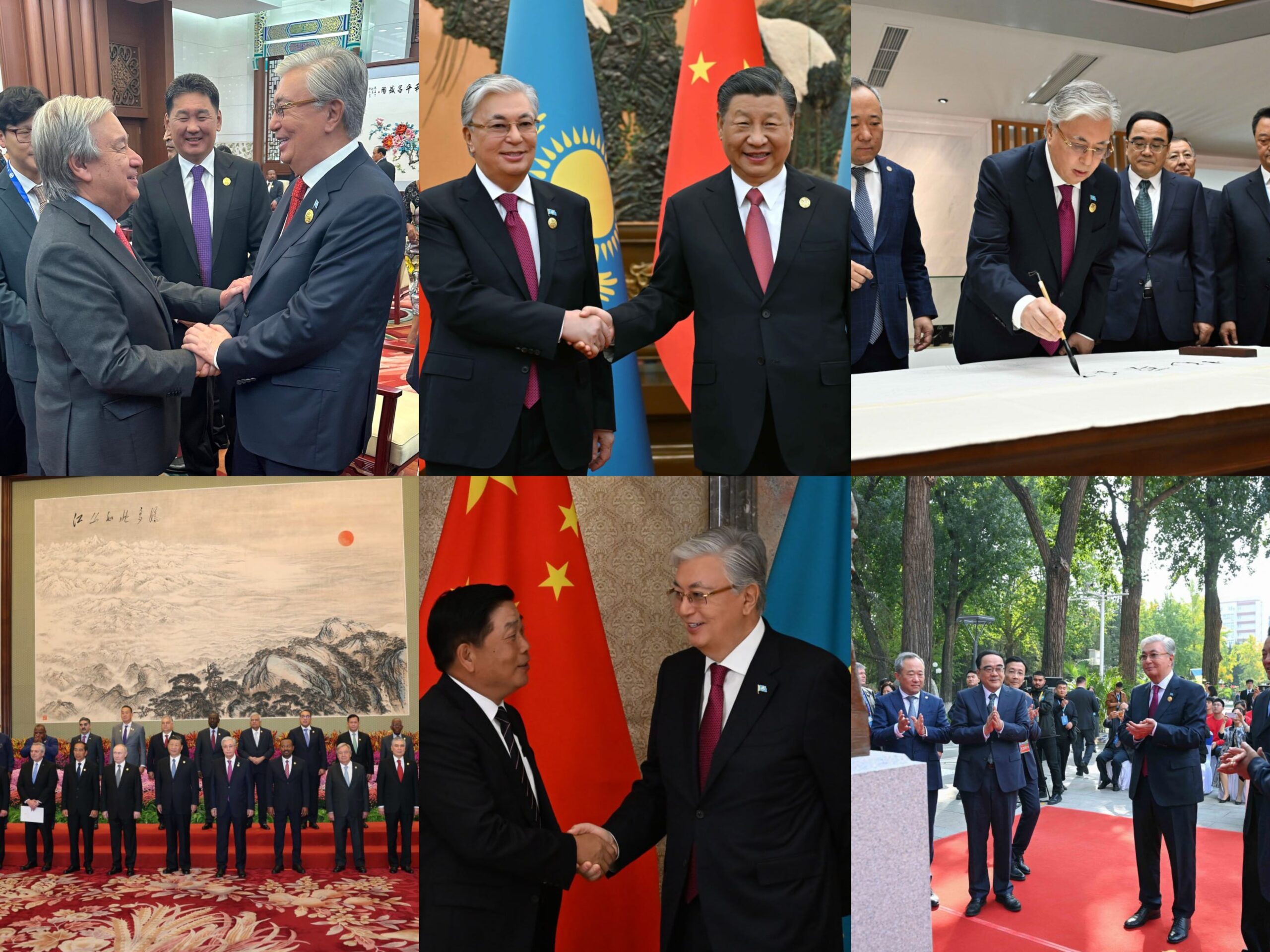
President Tokayev’s visit was packed with meetings. Photo credit: Akorda. The collage is designed by The Astana Times.
Experts agree that Kazakhstan benefits from the increased cooperation with China, in what political expert Urazgali Selteyev described as “fortunate” for the country to share a border with China.
“We must understand that the largest investor in Kazakhstan for the next decade is China. They are an economic hegemon, the first or second-largest economy in the world, and a leader in the entire East,” he told Tengrinews. “What is good about China is its focus on economics and business. They have a very pragmatic approach, and they are interested in markets, sources of raw materials, transit routes, and trade routes.”
Economics and business were indeed the focus of President Tokayev’s talks with Chinese leader Xi Jinping and top executives of leading Chinese companies. The two sides signed 30 commercial documents worth $16.54 billion. This adds to an investment pool of 52 projects valued at $21 billion, including significant projects such as the reconstruction of the Shymkent oil refinery, in which China National Petroleum Corporation (CNPC) has a stake and the establishment of the CaspiBitum enterprise in Aktau.
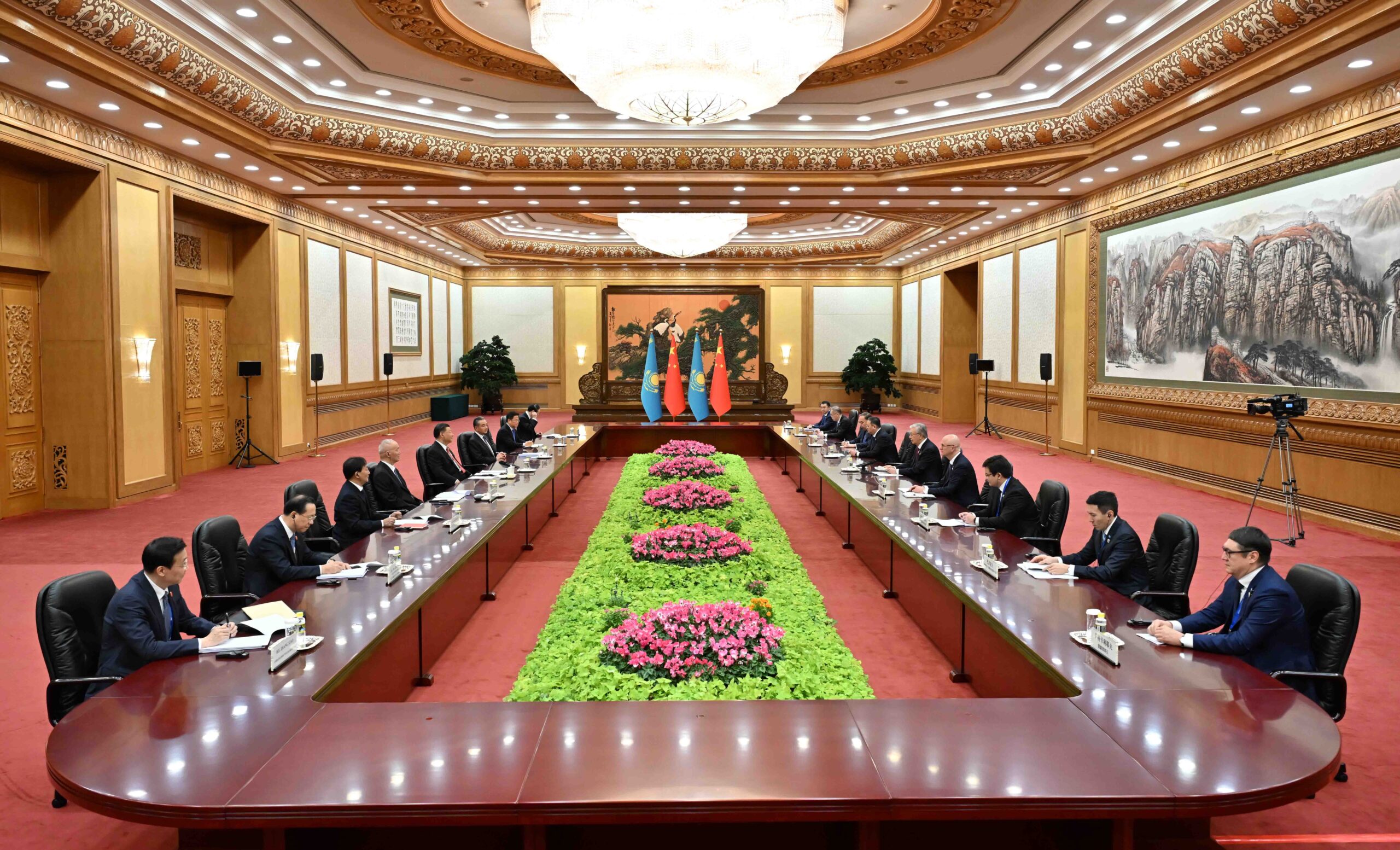
During the meeting, Xi Jinping thanked Tokayev for accepting the invitation to visit China and noted the importance of strengthening cooperation. Photo credit: Akorda
Qazaq Gas national company signed an agreement with China’s Geo-Jade Petroleum for the development of the Pridorozhnoye field in the Turkistan Region.
KazMunayGas (KMG) national oil and gas company and China National Chemical Engineering Group Corporation (CNCEC) also agreed to construct a gas turbine power plant (GTPP) at the Atyrau oil refinery.
Selteyev commended the agreements, noting that Kazakhstan needs to promote and develop what the country relies on, which is oil and gas.
“We see that KMG has extensive projects with Sinotech related to the construction of a plant for the production of polyethylene, petrochemical products, and road asphalt. These are areas we should have started working on two decades ago, and they will bring significant revenue from deeper oil processing,” said the expert.
He is sure that other agreements will positively impact the Kazakh economy in the long term.
Trade
President Tokayev and Xi Jinping commended the strategic partnership during their meeting in Beijing on Oct. 17, noting the dynamic development of trade. They described bilateral ties as an “eternal, comprehensive, strategic partnership.”
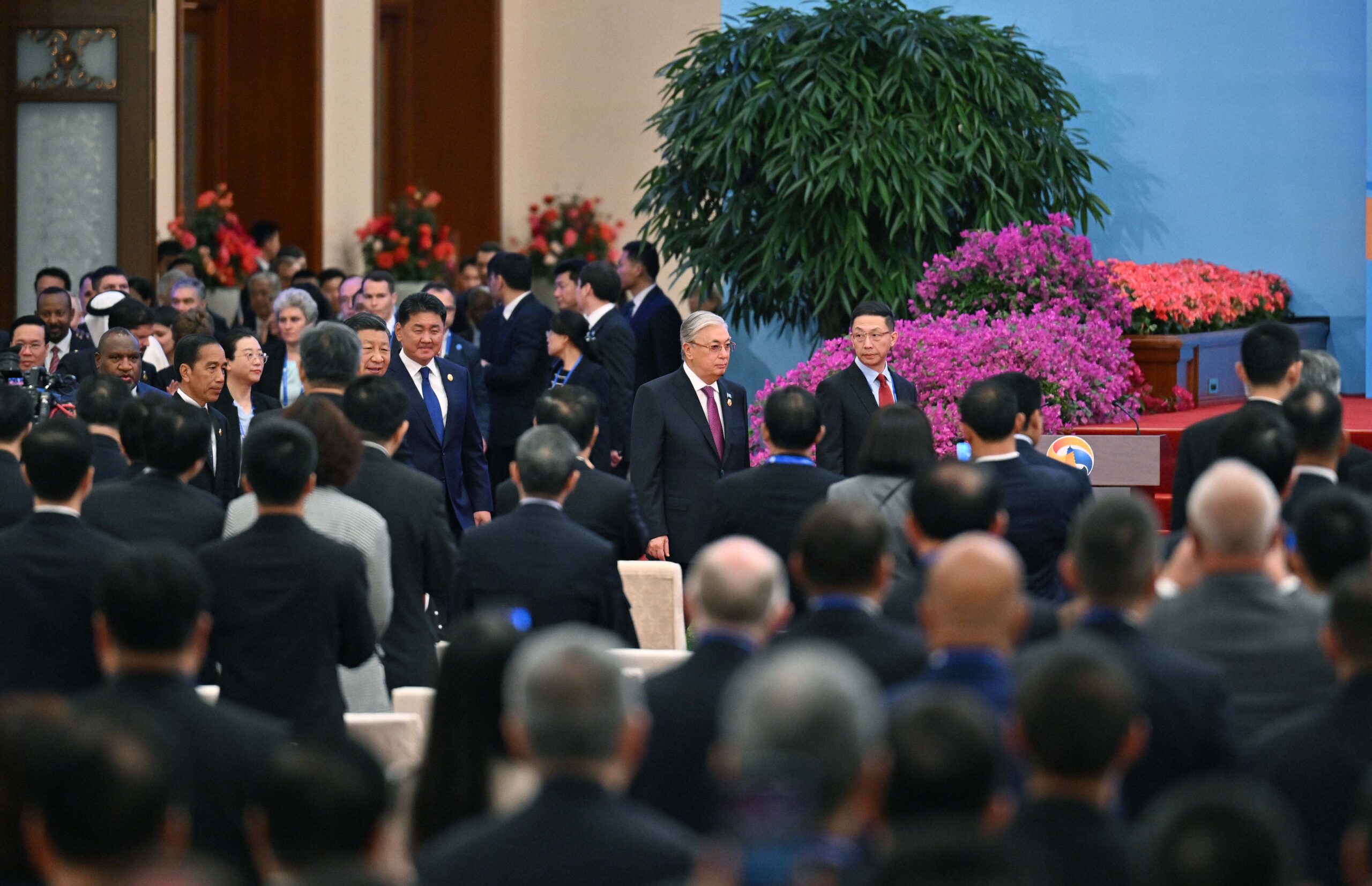
Tokayev also took part in the Belt and Road high-level forum. Photo credit: Akorda
According to the Ministry of National Economy, trade turnover between Kazakhstan and China between January and August hit $19 billion, 22.6% higher compared to the same period in 2022. China accounts for 21% of the country’s foreign trade turnover.
Exports from Kazakhstan to China increased by 2.1% to $9 billion in this period, largely driven by the increase in supplies of copper ores and concentrates ($1.7 billion), uranium ($553.1 million), wheat ($110.2 million) and barley ($102.4 million).
Imports to Kazakhstan from China increased by 49.5%, reaching $10 billion.
In 2022, Kazakhstan accounted for 45% of China’s $70.2 billion trade with the five Central Asian countries.
Investments
China is also among the largest foreign investors in Kazakhstan. Gross foreign direct investment inflows from China reached $748.3 million in the first half of 2023, up 30.6% compared to the same period in 2022, according to data from the Ministry of National Economy. This figure is the highest since 2019 when $789 million was attracted in six months.

Shymkent Refinery is one of the three major refineries in Kazakhstan. It is managed by CNPC and KMG, each holding 50% of the shares. Photo credit: cnpc.com.cn/en
China’s share in gross FDI inflows is 5.6%, the fifth highest among investor countries. A significant portion of investments come from CNPC, which is involved in the development of hydrocarbon deposits in the Aktobe Region, construction of the Kazakhstan-China main gas pipeline, and has stakes in oil fields in the Mangistau Region and in the Shymkent refinery.
Kazakhstan’s role in Belt and Road Initiative
During his visit to Beijing, Tokayev addressed the Belt and Road International Forum for Cooperation, the only leader from Central Asia to speak at the event.
The Belt and Road Initiative (BRI) is a significant global development strategy Xi Jinping proposed during his visit to Kazakhstan in September 2013. It is a massive infrastructure and economic project to enhance connectivity and foster cooperation among countries across Asia, Europe, Africa, and beyond.
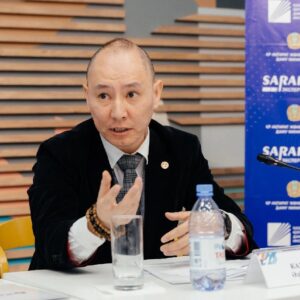
KazISS chief expert Adil Kaukenov. Photo credit: Kaukenov’s Facebook.
The implementation of this mammoth project for the past decade is an important milestone for Kazakhstan, too, said Adil Kaukenov, chief expert at the Kazakhstan Institute for Strategic Studies.
“In 2023, the Belt and Road Initiative marks its tenth anniversary since being announced in Astana in 2013. For Kazakhstan, which has been at the forefront of the modern Silk Road’s development since its inception, this milestone is particularly significant. These collaborative efforts have yielded remarkable results in bridging Europe and Asia. Notably, enhancements in transportation infrastructure have enabled container shipments between China and the European Union via Kazakhstan to surge by nearly 104-fold to date,” said Kaukenov.
Over the last decade, railways have facilitated the transportation of more than 6.5 million containers between Kazakhstan and China. Kaukenov stated that the volume of container shipments traveling through Kazakhstan on the China-Europe route skyrocketed by over 100 times. The numbers rose from 7,600 containers in 2013 to a staggering 790,000 containers in 2022.
“China offers a new model for the development of regions around the world through infrastructure development. Moreover, the Chinese approach is particularly interesting because Beijing is prepared to invest its reserves accumulated during many years of economic growth into the Belt and Road projects,” said Kaukenov.
Kazakhstan’s involvement in the BRI aligns with its goal to develop transport and logistics, as was reiterated by Tokayev in his state-of-the-nation address. Kazakhstan aims to bring the share of the sector in its GDP to 9% in the next three years from 6.2% in 2022.
“Kazakhstan is also keen to develop its transportation infrastructure in line with high international standards. This provides new opportunities for Kazakhstan’s citizens by connecting vast areas of Kazakhstan with modern routes and creating convenient avenues for Kazakhstan’s products to access global markets,” said the Kazakh expert.
Cross-border trade and transport cooperation
Discussing cross-border trade, Kaukenov highlighted that geographical constraints allow for trade with China in only certain areas. The most prominent of these is the Dostyk border crossing, which serves both road and rail routes. This crossing is situated in the Almaty Region, directly across from the city of Alashankou in the Xinjiang Uyghur Autonomous Region of China.
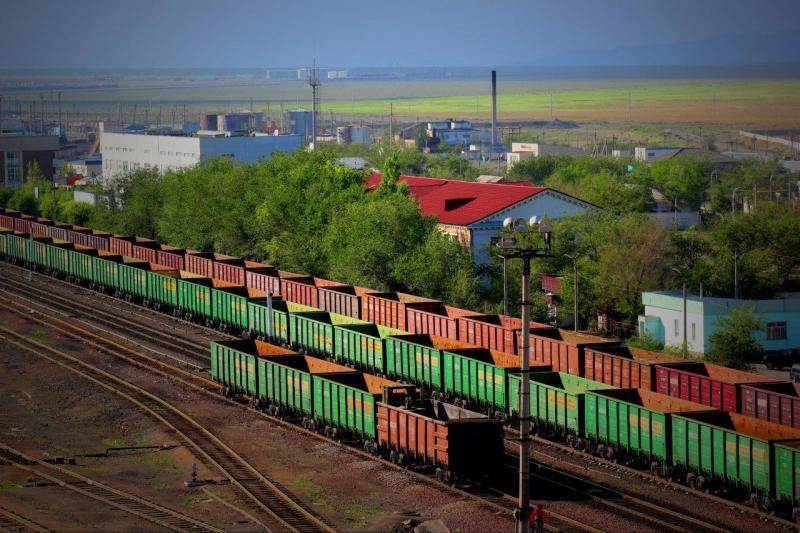
The connection of the railroads at the Dostyk (Kazakhstan) – Alashankou (China) border crossing took place in 1990. Photo credit: ktzh-gp.kz
“One of the promising projects between China and Kazakhstan is the expansion of this transportation cluster and the internationalization of goods passing through this region,” he said.
A foundational move towards internationalization and enhancing transportation flow was the development of the Western Europe – Western China road corridor, coupled with the railway extension to Khorgos.
Efforts are also underway to launch a new railway route to the Bakhty – Chaguchak border crossing, which will address bottlenecks and create “new focal points for the development of transcontinental trade.”
Since the launch of the Kazakh terminal in Lianyungang in 2014, more than 1.6 million containers have been transported. This terminal handles cargo from Southeast Asian and Asia-Pacific countries destined for both Kazakh and European countries via its territory and likewise manages shipments in the opposite direction.
During their meeting in Xian in May, leaders from Central Asia and China agreed to join efforts to accelerate the development of the Trans-Caspian International Transport Route (TITR), also known as the Middle Corridor. The route begins in China and passes through Central Asia – particularly Kazakhstan and Turkmenistan – before crossing the Caspian Sea and continuing through Azerbaijan, Georgia, and Türkiye to reach Europe.
During Tokayev’s visit, an agreement was signed between the two governments to foster the development of TITR, encompassing China-Europe container trains. The Kazakh Ministry of Transport and China’s National Development and Reform Commission inked a memorandum of understanding, committing to collaborate on the construction of the Tacheng – Ayagoz railway project.
